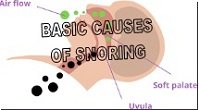
Basic Causes Of Snoring
 Many people snore occasionally, which is not a serious condition. Infrequent snoring, at worst, is annoying to your bed companion. As we got older, we typically snore more often. However, habitual snoring is a constant condition that can be serious. It disrupts your sleep patterns along with those of the people around you. Ongoing snoring means you are not getting quality sleep every night, which compromises your overall health. What causes this involuntary habitual snoring?
Many people snore occasionally, which is not a serious condition. Infrequent snoring, at worst, is annoying to your bed companion. As we got older, we typically snore more often. However, habitual snoring is a constant condition that can be serious. It disrupts your sleep patterns along with those of the people around you. Ongoing snoring means you are not getting quality sleep every night, which compromises your overall health. What causes this involuntary habitual snoring?
Are You All Jammed Up?
Obstructed nasal airways can cause snoring. Obstructed airways happen from allergies or a sinus infection. Physical deformities such as nasal polyps or a deviated septum can cause obstruction. A deviated septum is a structural change in the thin wall in your nose separating one of your nostrils from the others. Relieving obstructed nasal airways often helps minimize snoring. After all, you can’t breathe when you’re all jammed up!
What’s Happening With Your Throat and Tongue?
Your throat and tongue play a role in snoring. If these two muscles become too relaxed, they collapse and fall back into your airway. Sleeping pills, consuming alcoholic beverages and deep sleep can make this happen. As you grow older, it is normal for your throat and tongue muscles to become more relaxed. If you have bulky throat tissue, you might snore more.
What About Your Palate and Uvula?
Anatomy can determine whether you snore frequently or not. Your palate might be long and soft making the opening from the nose to the throat narrower. The same condition can also be caused by a long uvula. This is the hanging bit of tissue you see in the back of your mouth when you say, “Ah!”
Do You Have Sleep Apnea?
Sleep apnea is a serious condition associated with snoring. Throat tissues obstruct your airway, making it difficult to breathe. People suffering from sleep apnea often snore loudly and are then silent for up ten seconds or even longer. Obstruction of airways might be partial or complete. The airway can get so small that the sleep apnea sufferer does not get enough oxygen. The person wakes up for a brief second to force the airway open with a gasp or snort. This destructive snoring and stopping pattern can be repeated throughout the sufferer’s sleep time.

Leave a Reply